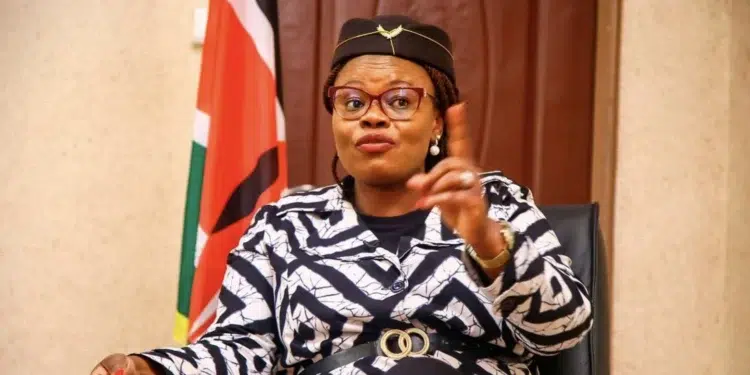The Githunguri member of Parliament, Hon. Gathoni Wa Muchomba, has made a scathing statement regarding the planned vaccination of 22 million cattle in the country, beginning January 2025. In her statement, the lawmaker chided the president over absolute power and challenged him to consult Kenyans before taking such actions.
She said the idea is alien to the Kenya Kwanza Administration and has some foreign influence in it. The lawmaker instead linked the idea to globalists, seeking to destroy the independence of Afrocans on the basis of production. She has linked the move to climate change theory, which claims that the fatulent release of the methane gas into the atmosphere is to blame for the excerbating climatic conditions.
Wamuchomba went a head to ask the president where he got the idea of vaccinating 22 million heads of cattle, the budget, yet he hasn’t reached out to Parliament on the same.
“This is not something to be taken lightly,” she said. Hon. Gathoni termed the idea ‘absurd’ and only seeks to broaden the globalization into an African affair. She has called on Kenyans and members of parliament to join her in rejecting the vaccination idea in totality.
Hon. Gathoni Wa Muchomba is not the first MP to have rejected the injection idea; Narok Senator Ole Kina rejected the idea from the day President Ruto made such pronouncements. He said that he wouldn’t allow his cows to be injected, no matter what.
President Ruto, while attending the Maa Cultural Festival in Samburu County earlier this month, informed pastoralists and farmers of the planned vaccination of 22 million livestock, including cows, goats, and sheep. On his statement, he reiterated that the vaccination will allow Kenya to access both local and global markets, which has been difficult to access to de livestock diseases
The Full Speech of Hon Gathoni Wa Muchomba on the Vaccination of 22 million Livestocks in Kenya
“I am here to respond to some querries concerning the recent president’s pronounciation and announcement in a public gathering; the intention of the Kenya Kwanza Government to vaccinate some 22 million animals, that’s cattle, including sheep, goats, and other domestic animals. The program is going to be rolled out in the whole of the country, touching on pastoralists, dairy farmers, and dairy goat farmers in Kenya.
I wish to state that from the onset, this is not our idea; this is a foreign idea being pushed to us with some clear intentions and deliberables. Listening to the president, it is clear that the intention is a climate change move that’s supposed to help us reduce the release of methane into the air.
The plan, which has the full support of the international research institutions, wants to introduce gene-modifying drugs into Kenyan livestock animals in order for them to stop emitting methane into the air. This is absurd!
We have had these animals for centuries; we have valued these animals as part of our heritage; we have used these animals as part of our lives. It is important for the president of Kenya before pronouncing such kind of plans to engage the people of Kenya very heavily because they are the real stakeholders.
It is not ok for the president to go into an international meeting and agree to vaccinate our animals without our consent. These statements have created a lot of tension. Farmers are worried. I want to put it very clear as a farmers’ representative and as a farmer myself: Those behind these plans claim that the animal’s natural release of intestinal gas into the atmosphere as a means of release from normal feeding and flatulent processes is a hazardous process to the environment. This is not something to be taken lightly.
As a result, our animals are expected to receive injections that prevent them from releasing the digestive gas into the environment indefinitely. That is to mean, if the drugs are injected today, it is irreversible. We cannot reverse back. Indeed, I take note with the larm that these vaccinations that were developed overseas have not been adopted there where they are being produced. They have been rejected.
And the owner of these vaccines is now trying to get entry into Kenya so that they can have a market for their products and work towards stopping us from producing our own foods and making sure that we are dependent on their foods. This is a globalist idea—an idea that comes with a lot of negative impact.
As a representative of a constituency where my voters are animal farmers, I reject these experimental programs in totality. Let everybody know that we will resist them till the very end. I ask my fellow Kenyans and my fellow members of parliament to join me in opposing the proposed vaccinations, which clearly hurt our animals, hurt our cultural heritage, endanger our people genetically, our animals genetically, interfere with our productivity and reproductivity of these animals, and totally have some cost implications.
Now that the president wants to vaccinate 22 million animals, does he have the budget? Are the farmers going to pay for these vaccinations? And if, as a country, we are going to spend money on vaccination, has he come to parliament for budgeting? Where will this money come from? And before these animals are vaccinated, how did he come up with 22 million? Has he counted every goat, every sheep, every camel, every donkey, and every cow (both meat and dairy) so that we can talk of 22 million?
Could this program of vaccinating animals away of globalists getting to our households to calculate and take data of our animals so that they use them for their own gains? Could this be an experiment? If it is an experiment, even if it was not an experiment, I, as a representative of the people and as a dairy farmer, am opposed to this. Join me as we reject these globalist ideas.”
-END-







